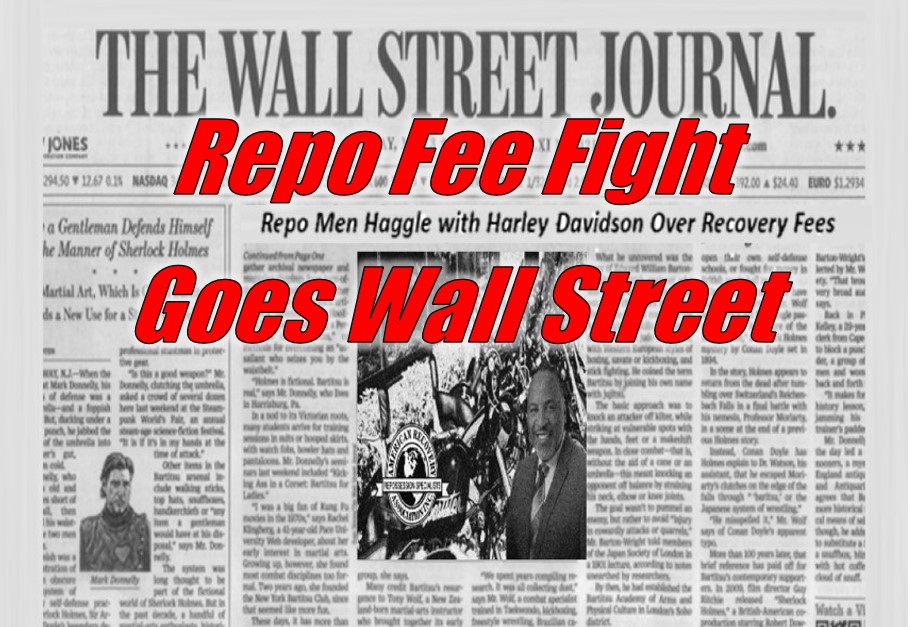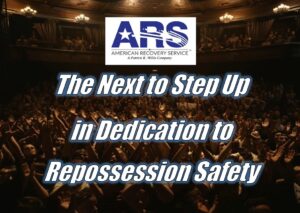“They expect the work for free, and that’s what we’re trying to get away from,” said Vaughn Clemmons, president of the American Recovery Association.
May 3, 2023 – As written about last week, Harley Davidson blamed a large portion of their increased loan losses on their inability to find enough repossession agents to repossess their bikes. Following interviews with ARA President Vaughn Clemmons, and Jeremy Cross, the Wall Street Journal helped straighten out Harley’s real problem. Low repo fees!
As mentioned last week, the Wall Street Journal (WSJ) who conducted interviews with Vaughn Clemmons and Jeremy Cross of the ARA. Wednesday morning, WSJ journalist John Keilman’s story was published. The article, titled “Repo Men Haggle With Harley-Davidson Over Recovery Fees” dove into the issue, and a little more.
For those of you who are not subscribed to the Wall Street Journal, you should subscribe for this article alone. But for now, I’ll feed you some quotes. It is a good and balanced article.
This is probably the most read worthy article on the condition of the repossession industry since the 2012 Huffington Post article; Repos Gone Bad: Are Big Lenders To Blame For Driveway Violence? And a very good read that I hope will open some eyes to persons outside of the repossession industry.
“They expect the work for free, and that’s what we’re trying to get away from,” said Vaughn Clemmons, who is president of Automobile Recovery Bureau in Houston and head of the American Recovery Association.
In response; “Harley said it values its relationship with the recovery industry. We recognize that in many cases, repossession within our sector is more complicated than within the auto sector,” the company said. “However, aligned with industry standards, we pay above and beyond including surcharges to recognize the complexity of the work undertaken.”
Their tone is understandably respectful and diplomatic but does not address their fees structure that existed before their recent charm offensive launched over the past few week.
The Wall Street Journal added; “Harley last week said that its credit loss rate was 3.2% in the first quarter, up from its typical rate of about 2%. The company said the first quarter is usually the worst for such losses because some customers tend to make their payments during the spring and summer riding season only to become delinquent later in the year.
Harley Treasurer David Viney said Thursday during a conference call with analysts that while the delinquencies weren’t especially high, the declining residual values of motorcycles and “a weaker repossession industry” led to more severe losses in the quarter. Mr. Viney said many recovery agents left the industry during the Covid-19 pandemic.”
No one in the repossession industry will dispute that the pandemic caused an exodus of agencies to leave the industry, A point the writer made below.
“People in the repossession business agree, saying their employee base shrank by as much as 40% over that period. They said work dried up as stimulus payments and enhanced unemployment benefits helped consumers stay current with their bills, and as some states imposed temporary moratoriums on repossessions.
Mr. Clemmons said the pandemic prompted some of his colleagues to put their tow trucks to less stressful and more profitable use, such as roadside assistance.
“Who wants to back up in a driveway at 3 a.m. and get shot at?” he said. “You can make the same money doing something else.”
The story shifts gears to some valid higher level topics surrounding repossession volume over the past three years that supports the point made of an issue existing in the reduction of repossession volume as exemplified by a statement from one of the auto industries topic experts.
“Cox Automotive, which tracks auto industry data, said that car, truck and SUV recoveries, by far the biggest part of the repossession business, have declined over the past three years. About 1.6% of the loan base was subject to repossession over that period. Over the 12 years before that, the average was 2.4%, according to the firm.”
Again shifting gears, but staying on topic, the reporter, Keilman, brought up a tiny tidbit of the CFPB’s Junk Fees proclamation, but stopped at their estimate of average repossession fee expenses. A sore point that Vaughn made a point of, as well as closing fees.
“The Consumer Financial Protection Bureau has estimated that agents are paid an average of $350 for an auto repossession, and recovery executives said that hasn’t changed in decades. Mr. Clemmons said that Harley has been paying extra fees, but that the amount still isn’t enough.
He said he spoke with Harley representatives last week and pressed for a “close fee,” which would cover a repo man’s costs even if he strikes out.
“It’s a conversation,” he said. “It’s a good thing that we’re conversing.”
According to the reporter; “Harley declined to comment on the fees. The company said during the conference call that it is making enhancements to its repossession strategy and expects the credit loss rate to drop.”
Wow what a shock…
While the writer explained the complexities of repossession motorcycles, I leave that for your later reading as most of you are already very experienced in this fruitless joy. And while they had a much deeper conversation with Jeremy Cross, one of the most analytical minds in the business, they disappointedly stayed somewhat topical.
Those situations don’t always go smoothly, said Jeremy Cross, owner of International Recovery Systems in suburban Philadelphia.
“Have you met some of the people who ride motorcycles?” he said. “They care more about their motorcycles than their work trucks or their family vans.”
Mr. Clemmons said one memorable case came when a Harley rider he had pursued for months finally agreed to give up his bike.
“We get to the guy’s house, and it was in 3,000 pieces,” Mr. Clemmons said. “It took us 2 ½ hours to get all those pieces cataloged and delivered back to the lot.”
Getting interviewed for the press is always a guessing game as to what they’re truly going to report. While WSJ journalist John Keilman’s well written article may not speak as loudly or vehemently as me, that is because he writes to a wider audience than me. I could cut what he does!
Let’s face it, it’s very unlikely anyone in the main stream press is ever going to be able to explain to the general public or business world the minutia of details that have suppressed repossession fees for all these years. The fact that they are paying attention at all should be satisfaction enough.
The reason they are paying attention, is because the repossession industry does matter to the business world. Let’s also hope that Harley’s sudden realization spreads and we start to see some dramatic improvements in fees.
Great job’s Vaugh and Jeremey and thank you John Keilman and the Wall Street Journal for taking the time to bring this topic on to the world stage.
Kevin















Facebook Comments